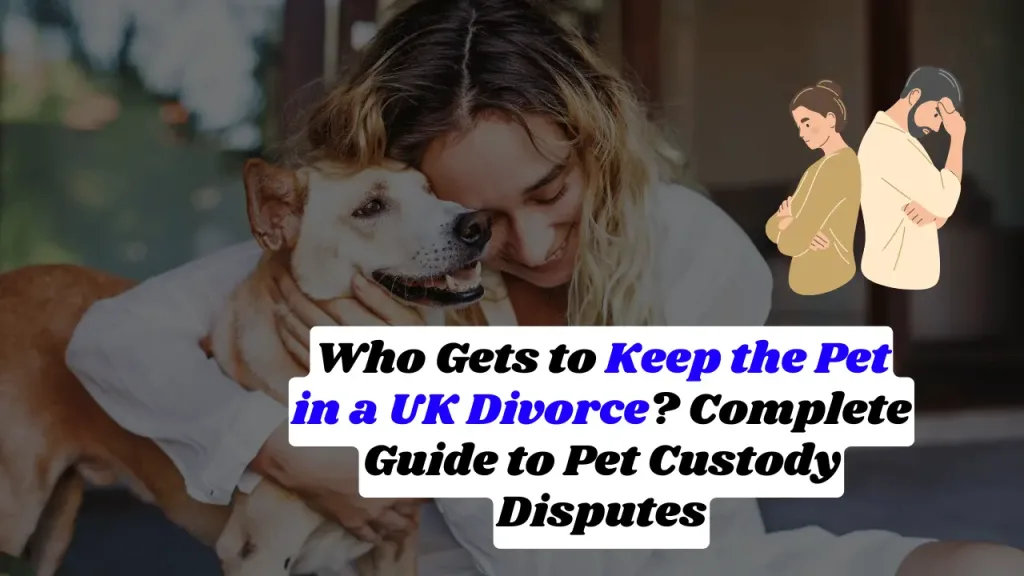Who Gets to Keep the Pet in a UK Divorce? Complete Guide to Pet Custody Disputes
Pets are treated as property under UK law during a divorce or separation, meaning the court typically decides custody based on ownership rather than emotional attachment. Factors like who purchased the pet, who paid for its care, and whose name is on the microchip or insurance often determine the outcome. Here’s everything you need to know about resolving pet custody disputes in the UK.
Recent statistics indicate the growing importance of pets in UK households, with 60% of households owning a pet as of 2024, according to the Pet Food Manufacturers’ Association (PFMA). Dogs and cats are the most common companions, making disputes over their custody increasingly prevalent during divorces or separations. In fact, legal professionals report a sharp rise in pet custody disputes, with some family law firms seeing inquiries double over the past five years.
Table of Contents
How Does UK Law View Pets in Divorce or Separation?
In the UK, pets are legally considered chattels, or personal property, similar to furniture or other inanimate objects. This classification may seem cold, given the emotional bonds owners share with their pets, but it is the legal framework within which disputes are resolved.
Pet custody disputes are typically handled by the civil courts (County Court), not the Family Court. If the dispute arises within a divorce, pets may be included in the financial settlement as part of the divorce proceedings.
Key Factors in Determining Pet Custody
When resolving pet custody disputes, courts consider several factors to establish ownership and responsibility, including:
- Initial Purchase: Who originally bought the pet and has proof of payment.
- Gift Evidence: If the pet was gifted, evidence such as text messages or social media posts can be crucial.
- Care Contributions: Which partner provided primary care, paid vet bills, and managed other pet-related responsibilities.
- Registration: The name on the pet’s microchip registration, insurance, and veterinary records.
- Financial Contributions: Who bore the financial burden for food, grooming, insurance, and other expenses.
What Happens to Pets in Cohabitation Disputes?
For unmarried couples, ownership is generally attributed to the person who paid for the pet. If the pet was jointly purchased, ownership may need to be resolved through negotiation or mediation. In such cases, options may include:
- Buying Out: One party compensates the other for their share of the pet’s value.
- Shared Custody: Both parties agree to share custody of the pet, though these agreements are not legally binding.
- Mediation: Encouraged to avoid lengthy and costly court proceedings.

What Legal Options Are Available?
- County Court Application: For disputes outside a divorce, you can file a claim using an N1 Claim Form.
- Divorce Financial Proceedings: Pets can be included in the divorce’s financial settlement.
- Shared Custody Agreements: Though not legally enforceable, these agreements outline each party’s responsibilities regarding the pet.
The Role of Pet Maintenance Orders
Family courts can issue pet maintenance cost orders during divorce settlements, accounting for expenses like:
- Veterinary care
- Pet insurance
- Grooming
- Food and daycare
This ensures the party retaining the pet has the financial means to care for it adequately.
What If the Pet Is Gifted or Jointly Owned?
- Gifted Pets: If a pet was gifted by one partner to another, the recipient may claim ownership, provided evidence supports the gift.
- Joint Ownership: Disputes often arise if both parties contributed to purchasing the pet. Courts may recommend buyouts or shared custody arrangements to resolve these conflicts amicably.
Related Articles For You:
What is Ancillary Relief in Divorce? Guide to Financial Settlements for UK Couples
Are Pet-Nups Effective?
A pet-nup (pet-specific prenuptial agreement) can specify:
- Who retains custody of the pet post-divorce
- Whether shared custody will be implemented
- Financial responsibilities for pet care
While not legally binding, pet-nups can be persuasive in court proceedings, helping clarify the intentions of both parties.
Common Questions About Pet Custody
Can I claim custody if I have more space and resources for the pet?
Courts prioritize legal ownership over living conditions. If there are welfare concerns, the RSPCA should be contacted.
What happens if one party sells the pet without consent?
Once sold, neither party can claim legal ownership. The court cannot intervene.
Can shared custody agreements be enforced?
No, shared custody agreements are not legally binding but can demonstrate intentions during disputes.
Does the species of the pet matter?
No, the rules apply equally to all pets, whether dogs, cats, rabbits, or exotic animals.
Practical Tips for Resolving Pet Custody Disputes
- Document Evidence: Keep records of payments, registrations, and care contributions.
- Consider Mediation: Aim for amicable solutions to avoid court proceedings.
- Seek Legal Advice: Engage a solicitor experienced in pet custody cases for guidance.
- Draft Pet-Nups: Proactively agree on pet arrangements during happier times.
Conclusion
Pet custody disputes are often emotionally charged but manageable with the right approach. Understanding UK laws, gathering evidence, and considering mediation can lead to fair outcomes. If you’re facing a pet custody issue, consult with legal professionals to explore your options and protect your bond with your beloved pet.
About the Author

Sarah Klein, JD, is a former family law attorney with over a decade of courtroom and mediation experience. She has represented clients in divorce, custody cases, adoption, Alimony, and domestic violence cases across multiple U.S. jurisdictions.
At All About Lawyer, Sarah now uses her deep legal background to create easy-to-understand guides that help families navigate the legal system with clarity and confidence.
Every article is based on her real-world legal experience and reviewed to reflect current laws.
Read more about Sarah
